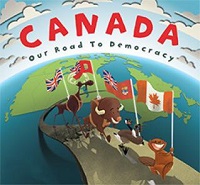| ________________
CM . . .
. Volume XXII Number 14. . . .December 4, 2015
excerpt:
These cleverly written alphabet books, filled with plenty of information and cool, little-known facts, showcase the people, places and policies that have made Canada the wonderful nation that it is today. Four animal characters appear in each book: Bo, the buffalo, Gabrielle, the Canada goose, Miki, the moose, and Bernie, the beaver. Their role is to act as a lead-in to each entry by way of a short, often humourous, conversation to engage the audience. Following this introduction of sorts are several paragraphs devoted to the topic. At the bottom of the page, one of the characters then poses a related question or suggests further investigation into the topic. For example, following the entry for “F is for First Nations”, Bo invites readers to mark on a map of Canada where the various First Nations peoples lived centuries ago and asks them to list the ways in which the explorers and settlers depended on First Nations peoples for survival; and after “L is for Lakes”, Bernie asks readers to find out what types of programs are in place in their community to reduce the amount of pollution in lakes and to think about how they could initiate a stewardship program. Readers are also encouraged to find and count tiny red maple leaves which are hidden in many of the illustrations, some leaves quite subtle and others more obvious. Though there is some repetition between the books, it is of a minor nature. Both books provide a glossary, the lyrics to “O Canada” in both official languages, and a list of web sites for further study. The rather angular cartoon-like illustrations seem quite simple at first glance, but upon further examination are filled with subtle details which contribute to the reader’s understanding of the text. Of course, the four main “characters” appear in many of them, adding a touch of humour. Part history, part geography and part cultural exploration, Canada…Our Home and Native Land… highlights the many aspects of the country which make it unique. The topics are as varied as they are interesting – from Anne of Green Gables and Terry Fox to chinooks, hockey and the Klondike Gold Rush. In this book, readers will find out that the prairie region is the world’s largest producer of flaxseed, mustard seeds and lentils, and that Niagara Falls’ Maid of the Mist boat tour is the oldest tourist attraction in all of North America. At the back of the book is a list of the provinces and territories with their capitals and official symbols (flower, tree, bird and animal), the poem “In Flanders Fields”, a list of useful web sites for information about Canada’s natural resources, national parks, Confederation, the environment, climate and First Nations, and a partial list of inventions by Canadians. This most impressive list includes the anti-gravity suit, Ginger ale, IMAX film format, Java computer program language, the Robertson screwdriver, plexiglass and the pacemaker. But readers will be especially surprised to learn that in 1874, Henry Woodward and Matthew Evans patented the first lightbulb which they sold to Thomas Edison. From the earliest Aboriginal Peoples to Confederation to our present-day nation, Canada: Our Road to Democracy is a helpful guide to understanding the ways in which the country is governed (municipal, provincial and federal governments), how elections work, the three branches of the federal government (Executive, Legislative and Judicial), the House of Commons and the Senate, the justice system, political parties, taxes, Canadian currency, and the Royal Canadian Mounted Police. Above all, however, the author stresses the freedoms that Canadians enjoy, from women’s rights to the Canadian Charter of Rights and Freedoms. At the back of the book is a list of Canadian Prime Ministers, British monarchs since Confederation, and a diagram of the three branches of the federal government. There is also a map with an accompanying list indicating the provinces and territories and their capitals. Not only are these titles jam-packed with useful information, but they also serve to instill among readers a great sense of pride in being Canadian. Highly Recommended.
Gail Hamilton is a former teacher-librarian in Winnipeg, MB.
To comment on this title or this review, send mail to cm@umanitoba.ca.
Copyright © the Manitoba Library Association. Reproduction for personal use is permitted only if this copyright notice is maintained. Any
other reproduction is prohibited without permission.
CM Home |
Next Review |
(Table of Contents for This Issue - December 4, 2015.)
| Back Issues | Search | CM Archive
| Profiles Archive |
